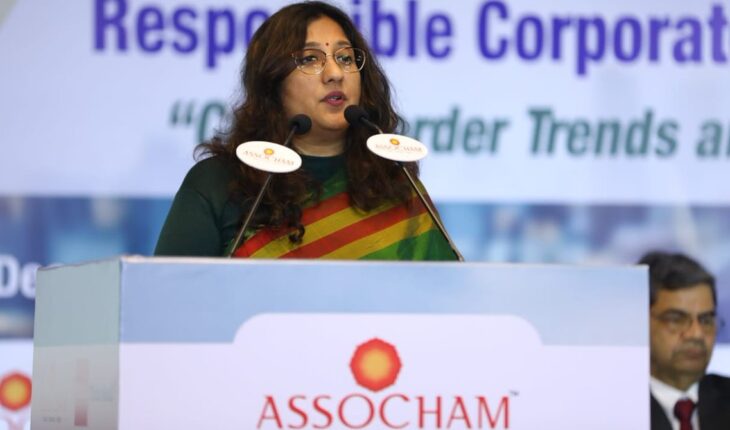New Delhi : Government frameworks have been aligning the interest of the shareholders says Anita Shah Akella, (IA&AS) Chief Executive Officer, Investor Education and Protection Fund Authority (IEPFA); and Joint Secretary, Ministry of Corporate Affairs, GoI at the ASSOCHAM-ACCA Global Summit Responsible Corporate Governance & Sustainability Reporting. We’ve been helping to manage the risk, enhance operational efficiency and also secure long-term financial viability. The government is more into regulating the corporate integrity for market confidence. And we look at balancing that without stripping the dynamism that underlies a very strong economy, giving a nudge towards more sustainable functioning that help the stakeholders. We have introduced an e-adjudication and an e-consultation framework which is for streamlining the legal proceedings and consultations. We are moving more towards an ease of doing business era, and an ease of exit of business doing era. We have decriminalized the offences under the Company Act 2013 marking a significant shift towards a more business-friendly regulatory environment in the country. The amendments to the Competition Act have been providing a robust mechanism and will deter any anti-competitive practices. We aim to ensure that India is a ground for the world to come and invest, play here, do the business and make the profits grow sustainably. However, we do aim to prioritise that our local industry and specially the MSME sectors receives handholding support as a value chain partner thus fair play would remain a business norm.
She further spoke about how this is an era where the businesses are now continuously, increasingly held responsible and accountable for what they give back to the environment, to the social and the governance practices. And the role of accounting and assurance in ensuring this kind of a transparency has never been more important than what it is today.
Adhering to the legal regulatory requirement and going way beyond the compliance to embrace the ethical standard is crucial. There are issues in accounting and assurance where is a complexity of the ESG metrics that are being formed. There is a lack of standardization of these metrics, she added. Different countries have different standards. It becomes a little difficult to operate in those lines sometimes. The data quality and reliability, the assurance cannot come much from that to integrity of the data and the reliability of data has to be assured.
Preeti Malhotra, Chairperson, ASSOCHAM National Council for Corporate Affairs, Company Law and Corporate Governance; and Past President, ICSI gave her welcome address by saying Responsible corporate governance is about ensuring that the company operates in a manner that is ethical, transparent and accountable. It involves implementation of policies and practices that promote integrity, fairness, responsibility in the business operation. With sustainability data it can help businesses with more profitable returns.
Helen Brand OBE, Chief Executive, ACCA spoke on the theme as it is also a business issue, as governments and regulators; investors; consumers and potential employees increasingly demand that any organization they choose to support; trade with or work for – must display a long-term commitment to a sustainable future. More than ever, a dedication to a sustainable future is a statutory and regulatory necessity, as well as a moral licence to stay in business.
A responsible legal system is the backbone of corporate governance, ensuring that companies not only meet their financial goals but also uphold ethical standards, transparency, and accountability in their pursuit of sustainable growth shared CA Dr. Ashok Haldia Chairman, ASSOCHAM National Task Force for Accounting Standards, Sustainability Accounting and Integrated Financial Reporting and Former Secretary, Institute of Chartered Accountants of India






